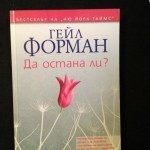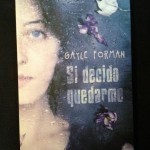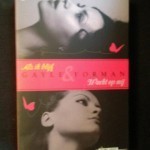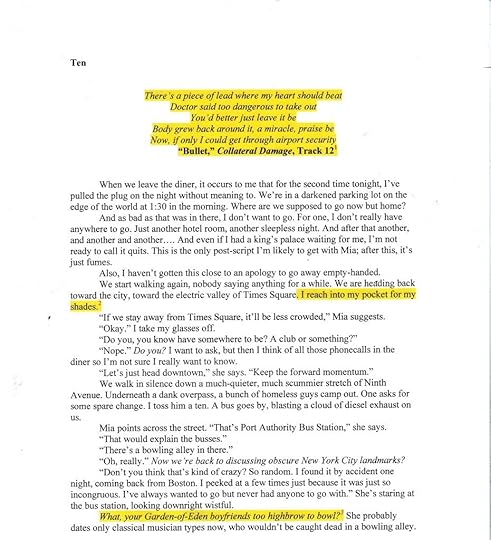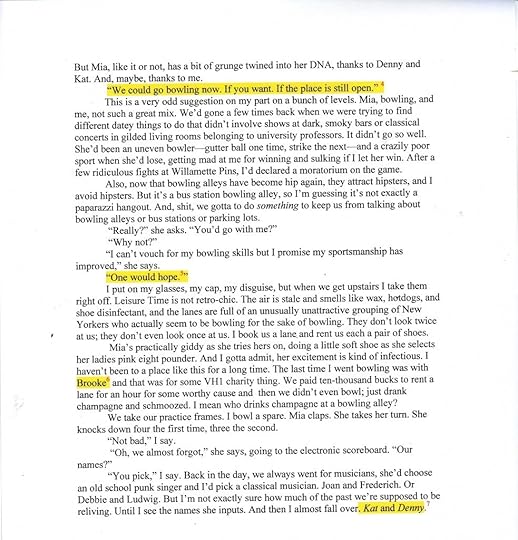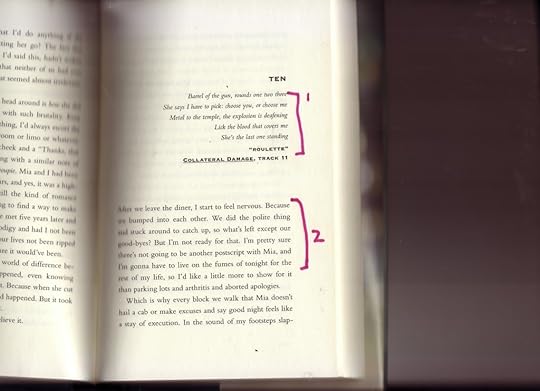Gayle Forman's Blog, page 2
May 25, 2012
how buffy saved my life
So, one night, I was walking through this graveyard when this evil beast jumped out at me and tried to drink my blood when all of a sudden this hot, kickass slayer chick came out and shoved a wooden stake through his heart, turning him to dust.
Okay, maybe that didn’t really happen. And maybe Buffy didn’t really save my life. But Buffy The Vampire Slayer, particularly season 5 and the start of season 6, got me through one of the hardest years of my life.
I just saw The Avengers, another Joss Whedon concoction, and I enjoyed it immensely, but it also made me feel so proud of Joss, in a very personal way that is wholly inappropriate given that I don’t know him. But I think it speaks to the debt of gratitude I owe Joss. For getting me through that year.
2001. New York City. In retrospect, my husband and I say that our 9/11 came early. In February when we got the phone call that would change our lives. Our closest friends, and their children, killed in a car accident. It seemed inexplicable. I’d just had an email from them that very morning. But it happened. And yes, if you’re wondering about how this ties into the story of If I Stay, it does. And you can read more about it here.
Less than a month after we buried our friends, my husband’s boss, someone we didn’t know well but who we liked and respected enormously, fell suddenly and seriously ill. I was freaking out. I didn’t know this person that well but I was calling my epidemiologist uncle to see what could be done. He couldn’t die, too. No. I wouldn’t allow it.
Death doesn’t answer to anyone but itself. He died, too.
All that spring, the ground seemed liquid under our feet. Like anyone could go at any time.
And on Buffy, where death is everywhere, Joyce, Buffy’s mom died. It was a quiet episode. There was no evil scheme. No villain. Nothing that Buffy could control or stake through the heart. It was just life. And death.
Click here to view the embedded video.
It devastated me. I watched it and wept. It ripped me open. It provided a portal, a hell mouth, to allow some of my grieving to come out.
But Season 5 wasn’t done with me. That season, which had started out so dubiously. Glory seemed like a wuss of a Big Bad. And the arrival of Dawn, Buffy’s out-of-the-blue little sister? Everyone knows that when you bring in a long-lost sibling, a show has officially jumped the shark.
Oh, Joss: Why do I ever doubt you?
Dawn being the key, Buffy’s devotion to her, Glory’s plans for her, Joyce’s death, and then of course, Spike, funny, sexy, marvelous Spike, suddenly sniffing around, and—could it be?—pining for Buffy.
Season 5 Spoilers to follow, but seriously, this is more than ten years old so don’t cry to me.
And then, Buffy dies. She takes a very Jesus-y swan dive into whatever nasty hellhole Glory opened up with Dawn’s blood. Understands what “Death is your gift” means. She dies to save Dawn. She dies to save the world.
I. Lost. It. Over and over. What could be cheesy, in Joss-land is both funny and emotional (Spike realizing Buffy is gone. Did I mention the me dying part?) and Buffy’s tombstone (She Saved The World. A Lot). All of it. It broke me and healed me all at once.
But 2001 wasn’t done with me, with any of us. Buffy Season 6 season premiered October 2, 2011. Mere weeks after the other 9/11, the big 9/11, careened into my city, shaking our foundations all over again. Was nothing safe?
Seriously, what hope did a TV show have against that?
I don’t remember Season 6 all that well. I missed the latter half of it (I caught up with it later) because my husband and I went traveling around the world for a year and learning that indeed the world was plenty safe. And I know some people don’t love it because it got a little rapey with Spike and Buffy. But I was here for the early part of the season, particularly for the brilliant musical episode, “Once More With Feeling.”
I can still sing large swaths of that episode many years later. And I remember watching it at my best friend Marjorie’s house, which is where I’d sat after 9/11 listening to the radio and waiting for her to pop (she was very pregnant) and for the latest anthrax attack on the city. (Did I mention, the anthrax was at my husband’s office?)
By the time “Once More With Feeling” aired, Josie was a newborn. There was a big crowd of us in Marjorie’s living room, that being a time when New Yorkers needed to come together (and sing; I remember singing New York, New York in a Union Square vigil as the moment when I understood that I was a New Yorker). But there we were, at Marjorie’s house. During that episode, everyone revealed their truths during song.
It’s full of great songs, including a particularly daring number between Willow and Tara (that show was the most progressive, or subversive, pro-gay show on TV, and it did it quietly) and a hilarious number with Anya and Xander. But the best song, in my opinion comes toward the end of the show.
Walk Through The Fire.
I will walk through the fire, Buffy sings.
I hope she fries, I’m free if that bitch dies—I’d better help her out, Spike sings. (Oh, Spike!)
We’ll see it through, it’s what we’re always here to do, the Scoobies sing.
Click here to view the embedded video.
At the end of that song, I wept. Because that’s just what you do. You walk through the fire. That’s what I was doing. Walking through the fire.
And then, at the end of the episode, when Buffy and Spike kissed, everyone in the room erupted into cheers. And Baby Josie cried out in alarm, or excitement, it’s hard to tell at that age. And we all just burst out laughing. With hope, with joy, and maybe with relief.
So, Joss, I guess I’m writing this for you ten years later, to thank you for getting us all through the fire.
May 23, 2012
New Contest!
Want to win a signed copy of “Where She Went”? Here’s your chance:
All you have to do is “like” or “follow” my Facebook, Twitter, and Tumblr (links below) and then either reblog this post or retweet my message about the contest on Twitter — bonus points if you do both!
Facebook: http://www.facebook.com/pages/Gayle-Forman/105124096187153
Tumblr: http://gayleforman.tumblr.com/
Twitter: https://twitter.com/#!/gayleforman
The drawing will be next Sunday!
May 16, 2012
Writers’ Advice? I’ll Give You Writers’ Advice!

So I just got back from a whole bunch of traveling and touring and got asked a zillion questions, but one of the most popular ones was this: What advice do you have for aspiring writers? I answered it so many times that I managed to edit down my usual blathering to a single Do and a single Don’t. Which I shall now pass on to you. And, not just that, but give you some actionable thing to do with these tips. Wait, did I just say actionable? There’s another tip for you: Never say actionable. It sounds so corporate.
Tip 1. DO OWN YOUR VOICE
So, once upon a time, back when I was a journalist, I had these aspirations to write for The New Yorker because I thought that’s where good journalism lived, even though when I was working at Seventeen I had one of the best journalism jobs ever—and, oh, you eyebrow raisers, I invite you to peruse my website for the articles I wrote about Afghan refugees seeking an education or the battle over gun control, played out through teens. And maybe I might’ve eventually placed a piece or two in The New Yorker but it would’ve been tough for a variety of reasons, one of the primary ones is that the voice that comes naturally to me is that of a chatty 17-year-old. Oh, sure, I can fake that erudite droll New Yorker voice (“On a drizzly May afternoon, Professor HotStuff sat in his wood-paneled office, a copy of a Russian-translated Iliad in one hand, the latest issue of BOOBS in the other….”) but it’s not really my voice. When I finally “surrendered” to my teen voice, writing my first YA novel, Sisters in Sanity, it was like a lightbulb, a Homer Simpson D’Oh moment, and the feeling of slipping into a hot bath on a cold night. It was just so right. I had owned my voice at last. And things have gone pretty well since.
So, the takeaway for you: Own YOUR VOICE. Write in the voice that comes naturally to you, not the voice you wish came naturally to you. I know that many young writers want to be Raymond Carver-esque. I fell prey to this, too (“Goddamit, Charlie! You lost your job again!”). And maybe this reality of a cigarette-infused trailer is home to you. Or maybe it’s not but the voice that comes naturally to you is that of a 47-year-old down-and-out dude. In which case, go with him (figuratively, not literally; stay away from that guy in real life!) Otherwise, you can dabble, until you find your true voice.
The thing is, when you write with your real voice, the work will be your most authentic, and that work is the most readable. Trust me.
Tip 2: DON’T WORRY ABOUT GETTING PUBLISHED
Can I tell you the number of 14-year-olds who ask me about getting published? It is crazy.On one hand, I am in awe of their ambition, because at 14, my biggest ambition was to date Nicolas Cage, okay, not him exactly but the character he played in Valley Girl:
[image error]
So I think it’s kind of amazing, this drive. But I don’t think it’s the best thing for your writing, at any stage, to be focussed on the endgame. But especially at 14. Look, stories about wunderkinds like the fabulous Kody Keplinger notwithstanding—and btw, I think Kody is an amazing writer in spite of her youth, not because of it; her books would impress me no matter what age she wrote them at—most people don’t publish books so young. And there’s a reason for it. Writing is one of those things, that unlike basketball or ballet, you only get better at with age! Part of that is because you need to practice it, and part of it is because the more life experience you amass, the more it filters into—and deepens—your work.
So relax. You have time. Stop trying to be the next Veronica Roth—and even as remarkably talented as she is, she was in college when she sold Divergent—and start finding the joy in writing.
That said, I understand that you want to show your work to people. There’s validation in that. And community. So first, might I suggest you start a writers’ group.
And I also understand that you want to get stuff published. And I’m not discouraging that. But if you’re still young, please don’t aim for the publishing deal yet. There are steps in between. Like Scholastic has this fantastic contest every year for writers and artists. The deadline has passed for this year but next year?
Figment is another great place to showcase your work. And they are constantly having contests you can enter.
And here’s something super-exciting you can enter RIGHT NOW. One Story, a wonderful literary journal that publishes one short story every three weeks, is launching a teen version, One Teen Story. And to kick it all off, they are running a teen fiction contest for those of you peoples between the ages of 14 and 19 as of 5/31. You can read the rules here but the basics are: You send in a short story. It gets judged (by yours truly, in fact). If you win, it is published, you get $500 and other goodies.
So, there you have it: A Do, a Don’t. And don’t forget about never writing actionable, unless it’s in dialogue and you want to show that a character is a total blowhard.
Oh, wait.
May 3, 2012
Guest Post at the blog Distraction No. 99!
Check out my guest post at distraction99.com where I answer the question What was your turning point as a writer?
Here’s the LINK!
May 2, 2012
Foreign Book Covers (Pictures)
March 26, 2012
a tale of two movies
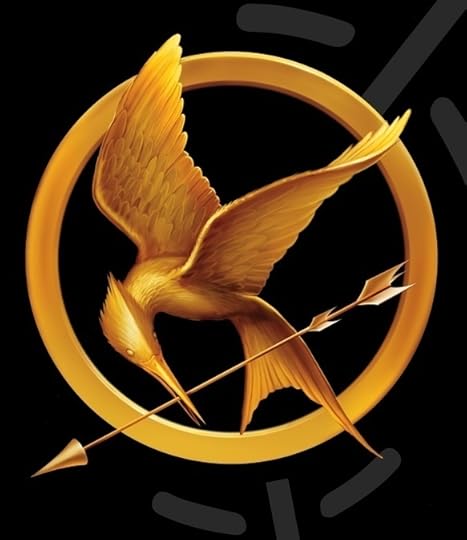

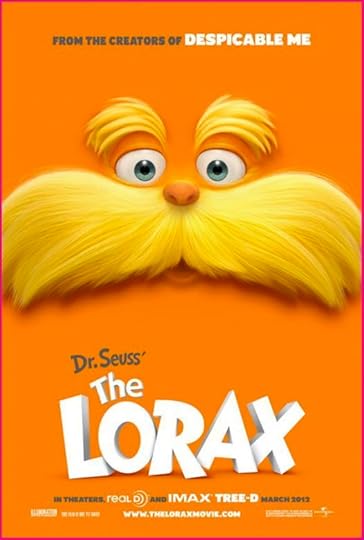
WARNING: THIS POST CONTAINS SPOILERS.
This weekend something unprecedented happened, and I'm not talking about the fact that a movie with a teen female heroine earned a record-smashing $155 million dollars at the box office, though that did indeed happen. No, I went to two movies in a weekend. Since I have had kids, this Just Does Not Happen.
The first movie was The Hunger Games. I've been reading some of the reviews of it, some rapturous, some mildly positive with a bunch of stuff about lost opportunities, very few negative. I dunno. I am a pretty harsh critic in general but I LOVED the movie. I personally thought it captured all the nuance and ambiguity of the book and Jennifer Lawrence was terrific. OMG, the quiet scene right before she enters the arena was spectacular. I found the violence to be the exact right amount. I mean, I know it had to be off-screen to get a PG-13 rating but by doing it this way, I found it chilling, and felt exactly what I think Suzanne Collins wanted us to feel: total gross ambiguity at every death. Because you're relieved that Katniss is okay. But embedded in that relief is some sort of gladness that it's another child killed in this absolutely absurd contest. Cognitive dissonance much? You can smile at Katniss's post-Cinna-makeover media triumph but then how different are you than the decadent ghoulish residents of Capitol, for whom all this killing is, to quote Jon Stewart, "horrotainment"?
I left the theater feeling drained, and I stayed that way for days. I cried several times, at one point openly bawling. It takes a lot to make me cry at movies, people. Now maybe I bring the source material in with me, maybe that deepens it and so I know all the nuance that goes on between the pages. But I thought that nuance was right there, playing out on Jennifer Lawrence's face as she fake-smiled upon being crowned the victor. Show don't tell is the first rule of writing. It also makes for the strongest acting. The Hunger Games was a visceral experience.
Now, I saw the movie at 10:30 on a Friday morning and the theater was pretty empty and most other filmgoers were sedate adults like me. So there was no cheering when one of the mean tributes gets offed. Or booing at President Snow. But nevertheless, I felt that the filmmakers, in making the film as they did, they trusted their audience. To get it. To get at the multiple layers, of enjoying something like this (or watching a war on TV like it's a movie) while at the same time understanding that enjoying it is part of the problem. I loved the fact that the love triangle was played down, that Katniss's ambivalence for Peeta was there, that she was a figure of integrity, not a sexualized hottie with a bow and arrow.
The movie rocked. And I'm so so proud that it represents kidlit.
Okay, on to the second movie. The Lorax. Another kidlit movie. Obviously, I'm not the target audience. But that is not why I hated this movie with a passion as bright as the Truffala trees. This is a movie that didn't trust its audience. It pandered to it. A dopey, soapy environmental message that if we all plant a tree, everything will be OK. I keep comparing it to the brilliantly subversive Wall-E, which charted similar ground of human greed and environmental degradation and the hope of one little plant, and it's weird because ostensibly they are about the same thing. But I left Wall-E both amazed (they made this? For kids?) and depressed (yep, we're heading for that, and I just threw my giant popcorn tub in the garbage where it'll go to landfill) and amazed again (the film was fantastic). I left The Lorax needing a shower.
For one, the motivating factor, why Ted (named after Theodore Geisel, Dr. Seuss, I assume; I wonder what he'd think of the honor) wants to find a tree is to impress a girl. The girl wants to see a tree. Which begged the question: Why wouldn't SHE go on the adventure to find it? And then, after finding out what went wrong with the trees (we chopped them down, now we have to pay for bottled air because no trees=no photosynthesis and the greedy air manufactures would like to keep it that way) there's some cute little adventuring and then everyone changes their minds and a Truffala tree is planted and it's all good.
Maybe if The Lorax hadn't merchandised to a sick amount (green cars, green detergent, the Lorax would approve. Dr. Seuss, I daresay, would not), I wouldn't have minded. Maybe if the girl character, who was the one who CARED ABOUT TREES, had gone looking for one, I wouldn't have minded (apparently, if I want to see that movie, I have to wait for Brave). Maybe if the reason for finding a tree hadn't been a kiss from the girl. Maybe if Ted had undergone some sort of transformation, maybe if the movie hadn't ended with some feel-good you-can-make-a-difference quote, but statistics about the number of trees cut down per minute in Brazilian rain forests and what kids can do to make a difference, maybe then I wouldn't be so angry. But I am.
Not just because the movie sucked, but because the filmmakers didn't trust their audience. That is the amazing thing to me about Wall-E and The Hunger Games. In both cases, filmmakers trusted their audiences to get the nuance. To understand moral ambiguity. To be in the uncomfortable position of consuming media and attacking consumerism and media. To understand the gray area and be entertained. The Hunger Games (and Wall-E) entertained me (and Wall-E my small children). And they made me think. And they made me feel. Which is the bar we should set for films, for all ages.
I will stop now. Perhaps it's good that I only get to two movies in a weekend once a presidency.
March 2, 2012
2012 new york teen author festival
It's here! Like all good things that come annually: birthdays, Christmas, Arbor Day! It's the New York Teen Author Festival. The super-awesome news: more amazing authors than ever!!! The slightly less-awesome-in-a-totally-selfish-way-news: I'm traveling most of that week, so I have to miss a lot of this. But I'll be at The NYC Big Read and the Mega-Signing.
Hooray.
David Levithan, organizer extraordinaire, outdid himself this time.
Without further ado, the schedule:
2012 NYC Teen Author Festival!!!!
Monday, March 26 (Mulberry Street Branch of the NYPL, 10 Jersey Street b/w Mulberry and Lafayette, 6-8):
Plotting Dangerously: Doing What it Takes to Find the Story
Coe Booth
Jen Calonita
Paul Griffin
Deborah Heiligman
Melissa Kantor
Morgan Matson
Kieran Scott
Melissa Walker
moderator: David Levithan
Tuesday, March 27 (McNally Jackson Bookstore, 52 Prince Street, 7-8:30):
The Mutual Admiration Society Reading
Madeleine George
Ellen Hopkins
David Levithan
Jennifer Smith
John Corey Whaley
Wednesday. March 28 (42nd St NYPL, Bergen Forum, 6-8):
Things Fall Apart: World Building and World Destroying in YA
Anna Carey
Sarah Beth Durst
Anne Heltzel
Jeff Hirsch
Andy Marino
Lauren McLaughlin
Lissa Price
Jon Skovron
moderator: Chris Shoemaker
Thursday, March 29:
The NYC Big Read
NOTE: SPECIFIC MANHATTAN LIBRARY LOCATIONS TO COME
Queens – Long Island City branch of the Queens Public Library (37-44 21 Street Long Island City, NY 11101)
Tara Altebrando
Brent Crawford
Gina Damico
Jeff Hirsch
Andy Marino
Jon Skovron
Alecia Whitaker
Manhattan – Locations to come
Jen Calonita
Anna Carey
Matthew Cody
Jocelyn Davies
Melissa De La Cruz
Hilary Graham
Christopher Grant
Leanna Renee Hieber
Anne Heltzel
Gwendolyn Heasley
PG Kain
Kody Keplinger
Lauren McLaughlin
Sarah Mlynowski
Eugene Myers
Micol Ostow
Stephanie Perkins
Jessica Rotherberg
Lena Roy
Erin Saldin
Leila Sales
Eliot Schrefer
Samantha Schutz
Mark Shulman
Arlaina Tibensky
Brooklyn – Brooklyn Public Library, central branch, Grand Army Plaza
Kate Ellison
Gayle Forman
Melissa Kantor
Barry Lyga
Michael Northrop
Matthue Roth
Victoria Schwab
Melissa Walker
Bronx — Bronx Library Center – 310 East Kingsbridge Road, Bronx
Elizabeth Eulberg
Paul Griffin
Alissa Grosso
David Levithan
Sarah Darer Littman
Kieran Scott
John Corey Whaley
Friday March 30, Symposium (42nd Street NYPL, 2-6)
2:00 – Introduction
2:10-3:00: Being Friends With Boys
Elizabeth Eulberg
Jenny Han
Terra Elan McVoy
Stephanie Perkins
moderator: Sarah Mlynowski
3:00-3:50: The Writer as Time Traveler: Writing the Past While Sitting in the Present
Judy Blundell
Matthew Cody
Jennifer Donnelly
Leanna Renee Hieber
Suzanne Weyn
moderator: David Levithan
3:50-4:40: No Ordinary Love: How to Create a Satisfying Love Story and a Satisfying Supernatural World at the Same Time
Andrea Cremer
Melissa de la Cruz
Jeri Smith-Ready
Victoria Schwab
Margaret Stohl
moderator: Barry Lyga
4:40-5:30: New Voices Spotlight
Emily Danforth
Kate Ellison
Lucas Klauss
Carley Moore
Aleica Whittaker
Friday March 30, Barnes & Noble Reader's Theater/Signing (Union Square B&N, 33 E 17th St, 7-8:30)
Andrea Cremer
Emily Danforth
Lucas Klauss
Stephanie Perkins
Siobhan Vivian
John Corey Whaley
moderator: David Levithan
Saturday March 31, Symposium (42nd Street NYPL, 1-5)
1:00 – Introduction
1:10-2:00 – Rising to the Challenge: YA Characters Facing Down What Life Throws Them
Tara Altebrando
Matt Blackstone
Susane Colasanti
Kody Keplinger
Siobhan Vivian
K.M. Walton
moderator: David Levithan
2:00-2:50 — Killer Instincts: Death, Murder, and the YA Novel
Jennifer Lynn Barnes
Gina Damico
Kim Harrington
Barry Lyga
moderator: Marie Rutkoski
2:50-4:00 — Moments of Truth: Characters at a Crossroads
Natasha Friend
Margie Gelbwasser
Jennifer Hubbard
Stewart Lewis
Sarah Darer Littman
Jess Rothenberg
Daisy Whitney
moderator: E. Lockhart
4:00-5:00 – Looking Forward to Fall
David Levithan
Marie Rutkoski
Eliot Schrefer
…and more authors reading from their upcoming books
Sunday April 1: Our No-Foolin' Mega-Signing at Books of Wonder (Books of Wonder, 1-4):
1-1:45:
Jennifer Barnes (Every Other Day, Egmont)
Matt Blackstone (A Scary Scene in a Scary Movie, FSG)
Caroline Bock (LIE, St. Martin's)
Jen Calonita (Belles, Little Brown)
Anna Carey (Eve, Harper)
Susane Colasanti (So Much Closer, Penguin)
Andrea Cremer (Bloodrose, Penguin)
Gina Damico (Croak, HMH)
Emily Danforth (The Miseducation of Cameron Post, Harper)
Jocelyn Davies (A Beautiful Dark, Harper)
Sarah Beth Durst (Drink, Slay, Love, S&S)
Elizabeth Eulberg (Take a Bow, Scholastic)
Gayle Forman (Where She Went, Penguin)
Natasha Friend (For Keeps, Penguin)
Kim Harrington (Perception, Scholastic)
Barry Lyga (I Hunt Killers, Little Brown)
Daisy Whitney (The Rivals, Little Brown)
1:45-2:30
Margie Gelbwasser (Pieces of Us, Flux)
Alissa Grosso (Popular, Flux)
Jenny Han (We'll Always Have Summer, S&S)
Leanna Renee Hieber (Darker Still, Sourcebooks)
Anne Heltzel (Circle Nine, Candlewick)
Jeff Hirsch (The Eleventh Plague, Scholastic)
Jennifer Hubbard (Try Not to Breathe, Penguin)
Melissa Jensen (The Fine Art of True or Dare, Penguin)
PG Kain (Famous for Thirty Seconds, S&S)
Melissa Kantor (The Darlings in Love, Hyperion)
Kody Keplinger (Shut Out, Little Brown)
Lucas Klauss (Everything You Need to Survive the Apocalypse, S&S)
David Levithan (Every You, Every Me, RH)
Stewart Lewis (You Have Seven Messages, RH)
Sarah Darer Littman (Want to Go Private?, Scholastic)
Elisa Ludwig (Pretty Crooked, S&S)
2:30-3:15
Carolyn Mackler (The Future of Us, Penguin)
Andy Marino (Unison Spark, FSG)
Wendy Mass (13 Gifts, Scholastic)
Terra Elan McVoy (The Summer of Firsts and Lasts, S&S)
Lauren McLaughlin (Scored, RH)
Sarah Mlynowski (Ten Things We Did, RH)
Carley Moore (The Stalker Chronicles, FSG)
E. C. Myers (Fair Coin, Pyr)
Michael Northrop (Plunked, Scholastic)
Micol Ostow (What Would My Cell Phone Do?, Penguin)
Stephanie Perkins (Lola and the Boy Next Door, Penguin)
Jessica Rotherberg (The Catastrophic History of You and Me, Penguin)
Marie Rutkoski (The Jewel of the Kalderash, FSG)
Erin Saldin (The Girls of No Return, Scholastic)
Leila Sales (Past Perfect, S&S)
Kieran Scott (He's So Not Worth It, S&S)
3:15-4:00
Melissa De La Cruz (Lost in Time, Hyperion)
Alyssa Sheinmel, (The Lucky Kind, RH)
Jennifer Smith (The Statistical Probability of Love at First Sight, Little Brown)
Jeri Smith-Ready (Shift, S&S)
Jon Skovron (Misfit, Abrams)
Victoria Schwab (The Near Witch, Hyperion)
Mark Shulman (Are You Normal?, National Geographic)
Margaret Stohl (Beautiful Chaos, Little Brown)
Arlaina Tibensky (And Then Things Fell Apart, S&S)
Siobhan Vivian (The List, Scholastic)
Melissa Walker (Small Town Sinners, Bloomsbury)
K.M. Walton (Cracked, S&S)
John Corey Whaley (Where Things Come Back, S&S)
Alecia Whitaker (The Queen of Kentucky, Little Brown)
Maryrose Wood (The Unseen Guest, Harper)
Natalie Zaman and Charlotte Bennardo (Sirenz, Flux)
February 29, 2012
before and after
This is part of the awesome Maggie Stiefvater's series on dissecting drafts:
Some books come out in draft form basically in tact. Of course, they will require revision, but the essentials of character and plot are set. Others require much of the heavy lifting in revision. Or, as was the case with Where She Went, the sequel to If I Stay, multiple revisions. I went through more than a dozen revisions before I even turned the book into my editor, and it was only after talking to her about it that the book opened up for me and I rewrote large portions of it, as you can see from the following chapter.
One of the major sticking points was Adam. He was so angry in the early drafts. Angry because, he—and I—were seething over why Mia had left him. But once my editor pointed out that wouldn't his promise to Mia at the end of If I Stay loom over him (he promises her to do anything, including let her go, if she stays), it changed the tenor of his anger from bitter and caustic to tinged with sadness and regret. And that changed everything.
BEFORE
1. In the initial draft, only a handful of chapters had lyrics preceding them. My editor thought that seemed weird so I wound up writing several more lyrics. I'd already written this lyric, but wound up moving it to a different chapter, where it fit Adam's explosiveness.
2. We need to see Adam being both paranoid and rock-stary. His fear of crowds, his need for anonymity, all encapsulated in his shades, but this also felt a little showy.
3. In this draft, Adam does not yet know about Ernesto. So it's more of a generic jealousy
4. Adam asks Mia to go bowling. Which makes sense on a certain level because he reads her yearning and would do anything for her and to prolong their time together, but at the same time, this invitation as it is in this draft just doesn't work. It felt forced somehow.
5. Dude, Adam is SO angry. It just leaks out is sarcastic asides like this. The caustic anger was a problem.
6. In the early drafts of WSW, Adam's girlfriend was Brooke Vega, the rock star from If I Stay. My editor was on the one who made the wise point that by having Brooke be the girlfriend, it cast retroactive doubt, like maybe they'd been fooling around all along. The important point was that whoever the girlfriend was, she was somehow connected to Mia.
7. This is a first hint at how Mia has coped with the loss of her family. The ways she keeps them alive. And that it freaks Adam out causes her to clam up a bit. Note how this impacts pacing, two steps forward, one step back.
8. I wanted Adam and Mia to go bowling because I have gone on some very romantic bowling dates myself and because I love the bowling alley in Port Authority, finding the hidden things in plain sight. But I also knew that this section would have to somehow touch on Mia's injuries/rehab. The final version does the same thing, but does it differently.
9. Some hints here as to how estranged they became from each other during her rehab, and how music became the sole source of comfort for her.
10. When I was writing WSW, one of my inspirations for Mia was the cellist Alisa Weilerstein, who plays very theatrically and intensely, especially when she does the Kodály. I initially had Mia playing that in her recital. I changed it for the final pages. See why below.
11. Mia is the one who asks Adam to bowl for them both. Note how the dynamic changes in the final version, when it's Adam who offers this.
12. Adam's anger is so caustic in this draft and that anger fed lines like this, which make him unlikable. When the reason for his anger shifted, the tone changed. See the finished pages.
13. I'd wanted the interplay between Adam and Mia here to seem tortured because they can't communicate with each other. He doesn't know what's going on with her and she isn't explaining it well. But Mia just came across as annoyingly coy so some of this had to be spelled out earlier—the fact that she was graduating early—and then in the final draft, she explains this before they enter the bus station.
14. All of this is important. Adam's frustration with being ejected from Mia's life, his feeling that he cannot simply ask. But by having it come this late in the story, it sort of prolongs the bitterness. In the final draft, this comes earlier, so that he has these feelings early on, and while they continue, what goes on in the bowling alley is something else entirely. See the final pages to see what I mean.
15. This tracks back to If I Stay, when Mia's decision to go to Juilliard was a source of tension between them. Juilliard has always been Adam's rival, and now she dumped him when she got there, so of course he feels conflicted.
16. Another hint here about Mia's state of mind, her dislike of being coddled.
17. This is such a throwaway line. It's empty. In the final draft, Mia asks him a question about being on the road and Adam's answer, or lack of one, is revealing.
18. I hadn't done my Juilliard homework yet. This is not what first-year cello students would take.
19. This is one of those self-pitying lines that just magically disappeared in the later draft.
20. There's a delicate dance going on here as Adam bowls for both of them. He is reading so much into what he thinks she thinks and he's adjusting his own performance accordingly but when he sabotages himself, he is angry at himself. Which is basically a small-scale version of what's going on with them on the larger scale.
21. This is Angry Adam again. Pissed off at anything. Notice how this changes in the revised pages.
22. This is a pivotal moment for Mia. She really is reaching out, acknowledging that she and Adam have this shared thing, this shared understanding. Which works. But all the stuff that comes after it—Adam's purposely guttering her ball, Mia realizing it—it actually undercuts the reaction I wanted Adam and the reader to have.
23. Here's another example of Angry Adam who's still seething at the WHY Mia dumped him and therefore wishes her ill, even if he's conflicted about it. Notice how this changes in the final pages.
24. Here we get a sense of Adam's ongoing conflict, his desire to protect and punish Mia, which is understandable. A little bit of this can be sexy. Too much can be annoying. I cut some of this here and saved it for an explosive scene later on when Adam thinks he's recognized on the subway.
25. This is a pretty weak ending. I like to end chapters with a kind of emotional wallop if possible. Give you something to chew on. See the final pages to see how I did.
AFTER
1. The lyric changed. The previous one went before a different chapter, one in which Adam's anger explodes. It felt more appropriate to have a lyric here in which we see Adam's innate understanding of Mia saving herself, at his own cost.
2. The opening to this chapter is so much tighter. Because of the episodic nature of the book, it's easy to get bogged down in "transportation," not literal transportation, but a bunch of unnecessary exposition between chapters. Miss it? Me, neither.
3. You see Adam being a jerk a lot but his hearing the word reprieve in footsteps is a glimpse into his vulnerability.
4. The idea of the urban Easter Egg hunt came in the final revision and became one of my favorite descriptions.
5. Also, by introducing this urban Easter Egg hunt, it clicked a tiny little flashback of Mia's family. I wanted to go very easy on the flashbacks, just glimpses here and there, like this to show how enmeshed Mia and her family still are in Adam's fiber.
6. FYI: This is why I love New York.
7. There is a disconnect over Adam's life. How Mia sees it versus how it is, which is key in explaining some of her behavior. It's hinted at again here.
8. Adam sees that Mia is nervous. Neither one of them has any idea what is going on with the other.
9. Major change from earlier draft: Mia is the one inviting Adam to hang out for the night. Because Mia is so mysterious—we don't know why she left him—and kind of coy, it was important to see her do something active, to show she wanted to be with Adam, too, even if he didn't fully see it.
10. The why? Why is she inviting him. The why is really the whole point of this book.
11. The announcement of Mia's pending departure from NYC came later in the earlier drafts. Important to have it earlier, to raise the stakes and ratchet up the tension, sense of clock ticking.
12. Here again we see the two faces of Adam: How he really feels and the persona he projects. Which adds to Mia's confusion.
13. All that stuff in the earlier draft about his glasses and cap is condensed into this.
14. It makes sense that Mia would not bowl in the first place, given her elbow and her career.
15. The flashback of rehab, a glimpse of Mia's steely resolve.
16. Now the jealousy is more specific. Adam is jealous of Ernesto.
17. Adam's suggestion that they go bowling makes more sense, given Mia's injury, given his desire to one-up Ernesto. But it's also a generous gesture, in response to her gesture to extend the evening. It tempers the rancor to have them doing sweet things for one another, so you don't get overwhelmed by negativity.
18. Brooke has become Bryn. There are more details of the charity event, which make Adam's life pop more
19. I like olfactory descriptions, what things smell like. I find they, along with aural descriptions (what things sound like) are so powerful.
20. Note how with Mia inviting Adam and Adam offering to bowl, the entire tenor of this scene now changes. Adam doesn't find Mia diva-ish but kind of endearing.
21. Mia asks Adam to take off his glasses. It's a subtle request to reveal himself. Also, the context thing is a seed planted for a later scene.
22. Important to show Adam's embarrassment with the glasses, insight into his character.
23. This is all much tighter now that we've handled the confusion about where Mia's going in earlier chapters/earlier in this scene. It no longer bogs down the pacing.
24. Adam's "no" is a first clue to Mia—not the reader—that Adam does not really enjoy his rock-star life. It's also a baby-step, the beginning of being honest.
25. But just a baby step. The chasm between Adam's life, Mia's perception of that life and how Adam communicates that life, is a major motif in the book. It really begins to break down later on.
26. Further hints of the claustrophobia of his existence.
27. The bowling provides a way for readers—if not Mia—to see Adam's frustration physically manifested.
28. Therapy: Again, more tiny clues into Mia's rehab. I did not want the book to be a rehab book. Little brush strokes let the reader fill in the bigger picture.
29. Instead of being angry at Lemsky, as he was in the earlier draft, Adam is now in agreement with him about Mia's talents. This doesn't really mean that Adam likes Lemsky. Adam, released of some of his anger, can see that Mia, in spite of his crazy conflicted feelings for her, is an incredible musician. He won't deny her that.
30. By bringing up the band, the estrangement Adam feels toward them, toward music, becomes much less abstract. There literally is an ocean between them.
31. The Kodály from the first draft became the Dvořák. On the page, Alisa Weilerstein's intensity read as anger. I wanted music to be a place of escape and peace for Mia, so I had to find a fitting piece.
32. This paragraph crystallizes all the things that killed music for Adam. And they all track back to losing Mia.
33. The kicker. So much more powerful than the earlier one. And it just hits on what this chapter is about: Mia finding solace in music (and life), Adam losing it. It also segues well into the flashback, which is about Adam and the band falling apart.
February 9, 2012
the perfect song
I started this blog post a few months ago. I never posted it. But now with the Grammy's coming up and my draft not feeling so hideous, it feels germane.
WHAT I WROTE THEN:
I have been thinking a lot about the perfect song in the last few months as I've been working on a draft of my very imperfect novel.
It's partly because I have been having an enduring love affair with Mumford & Sons Sigh No More album since I first heard it almost a year ago. It contains an embarrassing number of perfect songs (and I'll get to my definition of perfect in a minute). And because I came late to Adele's 21, which contains one perfect song. And also because of an ongoing dinner-table conversation my husband and I have about musical artists who will release one incredible album, only to follow it up with a dud. (Yes, this is what we talk about over dinner. Now you know where Adam comes from.)
We argue about why this is. What is with the follow-up slump? Do bands use up all their inspiration? Do they choke? Do they get so much attention from the perfect song/album that bigtime producers come in and muck around with what was a perfectly simple recipe? Or is it that the perfectly good recipe worked for one album, but not the next? Or perhaps maybe the perfect record/song was a product of alchemical serendipity that is never to be repeated?
I understand that a perfect song is subjective but to me, a perfect song is a lot like Mumford & Son's "Sigh No More" or "The Cave." Or Adele's "Rolling in the Deep." Or some of the other songs I've put on the list below. A song that starts out with some kind of riff or rhythm that catches your attention straight away, gets your toes tapping. Then it starts to build, bringing it added instrumentation or vocals that create or sort of maelstrom effect, so that the next thing you know, your into the song in both a physical and emotional way. This is all happening on the first or second listen—long before you pay attention to the lyrics, which are subtle or profound or just lovely. Then the music builds and builds and you feel it build in you so that your emotions build with it until you have a sort of crescendo or catharsis or dare I say it? climax with the music itself. When I hear a perfect song when I'm running, I will sometimes feel like I have wings. A perfect song makes me feel like I can fly. (And no, sorry, R. Kelly, not yours).
What I want to know about the perfect song is that the ingredients, seeming so obvious to me—the girl who can play rudimentary chords on a guitar but that's about it—are they obvious to every musician? Do they know that the perfect song is out there but just can't quite get it? Do they think they've got it? Do they give up? Do time constraints get in the way? Does creativity run out? Or do they think they've written the perfect song and I just happen to disagree?
For my husband, these musings are philosophical and aesthetic. For me, they are a bit more grounded in the real life. Like every writer I know, I'm trying to write the perfect song. I want every book I write to make my readers feel like they can fly. Which, you know, is a pretty tall fucking order. I might as well wish for world peace while I'm at it. And also the abolition of car alarms. And someone to bring me a perfect sandwich like the kind they make at WitchCraft whenever I need lunch (like now).
And like every writer I know, I'm frustrated by the chasm between what I am hearing in my head and what I'm hearing, so to speak, on paper. Sometimes, a song comes out before you even realize you're writing it. I wrote IF I STAY in three months without even realizing I was writing a book. I don't know if it's perfect but it is the way it should be. There is no chasm in my mind between how the book should be and how it is. WHERE SHE WENT took me 21 drafts. It was a muddled song. I didn't know if I would ever get there. I got there, but only after turning it into my editor and having her say two really smart things that made me realize I was writing in the wrong key.
Now I'm deep in a new book and feeling miles away from any kind of melody, let alone a perfect song. And the terrifying part is knowing. Knowing the wide distance between what you can accomplish and what you are producing and knowing that you might not ever get there. That at some point, you won't get there. I try to calm myself down. My deadline is not for three months. I have several months of tinkering, and then my editor extraordinaire gets her hands on it and we go through the revision process all over again.
AND NOW:
So that's where I stopped. Because it was just seeming too depressing because I genuinely worried I'd never get there. Because this book is kind of outside my comfort zone (no musicians, no death; how twisted that death is my comfort zone).
But then I just got to work. And kept chipping away, and I don't know that the song is perfect, but it's definitely starting to sound like the tune in my head. At least to me. How it sounds to you all is an entirely different matter and we all have our own opinions over what comprises a perfect song (mine is correct, though).
Also, as it happens, the Grammy nominations were announced a short while after I wrote this blog and it created a bit of a Perfect Song War in our household in the Best Song category, with my 4 year-old favoring Adele, my 7 year-old loving Katy Perry's "Firework, "and me and the husband firmly in the Mumford Camp. I don't know that "Firework" is a perfect song, but it's pretty damn catchy, so I've added it to the list.
Why do you think most bands can't repeat the magic, if you indeed think that? And what are your perfect songs? Tell me and I'll post a new playlist.
[image error]



February 6, 2012
doors and books and doors to books
 Here's a sentence I never thought I'd write:
Here's a sentence I never thought I'd write:
I am stripping a door.
Funny what owning a house will do to you. Yesterday, my husband was walking around sporting a measuring tape snapped to his pocket—and I'm more of the guitar-over-hips fantasy, but whoah Nellie, I get the construction worker thing now!—and I am stripping a door.
I'm also revising a novel.
Turns out, they are totally the same thing.
You start out with this solid mass. A 60-year-old door. An 80,000 word document. Same diff. They are both large and unwieldy and kind of ugly. Yet, you suspect somewhere within this mass is something better, something worthy, something you want to display to the world. But first, you have to dig it out of all the layers of crap.
To begin with, it seems easy. You just need the "write" tools. Computer, pen, paper, friends with eagle eyes. Chemicals, scrapers, gloves, eye goggles.
It helps if you know what you're doing, but if you don't, you'll figure it out. Some things are just kind of intuitive.
You jump in.
You scrape off one layer of paint, then a second, then a third: brown, yellow, aquamarine, more brown. You learn things about the people who lived in the house you live in based on their multiple layers of paint. Like my office must've been a nursery at some point (see aforementioned aqua paint).
It is a messy process. Eight coats of paint turning all wet and gloppy starts to look like an oil spill. Without the cute birds. And FEMA.
Now, with the revision, you start chipping away, or adding (we are doing metaphorical comparisons here, people). You find layers of your story that you never knew existed. Other layers that are as disgusting as 43-year-old newly wet paint. The deeper in you get, the messier it all becomes. The colors all swirl together. Everything turns gray. The mess seeps into everything. You can't get away from it.
Sometimes, you want to turn back. To just settle for that ugly painted door. Or get a new one at Home Depot (you are boycotting Lowe's). To say that the book is "good enough" and turn it in.
But you can't because what's the point in writing a book only to have it not be as good as it possibly can and what's the point point in having a door if it's ugly? And you've never been one for settling. You're going to have to live with that book. And that door.
So you keep going, even though your pants look like this:
And you suspect your brain looks like this:
[image error]
Because there is no going back.
You take your time. Because every day, you get off another couple of coats of paint. Or you figure out a new tweak to a character. Only to discover that there is more paint underneath and that the character tweak caused a cascade effect and now you've got way more work.
You think you're almost there, only to realize, you're not even close.
Something's not clicking into place yet. That stuff you thought was the wood and therefore the finish line, turns out to be a sort of wood wallpaper that someone put ON THE WOOD DOOR.
Do you see that light stuff that looks like blonde wood? It is not wood. It is WOOD-PATTERN WALL PAPER. It goes on with glue and has to be chiseled in sticky, gluey clumps. (Why did you do this, 1950s people? WHHHYYYY?)
You keep going.
You won't know when you're done. Not until you get there. You think this is it, but turns out, there's a layer of navy paint, adhering to the wood like your kids on you at bedtime. I don't wanna go!
You keep going. Because after you finally dig down past the eight or nine or ten layers of paint and wallpaper, you hit this:
Wood!
Pretty wood! From a tree! From at least 60 years ago!
And…
Book!
Not-totally-making-me-barf book. Book that might some day be read-able book.
And it gives you hope and motivation. To carry and and get the job done, to get all the gunk from the moldings and do the other side of the door and sand and varnish it and revise and polish (okay, that part happens after I turn it in and my editor, an industrial strength stripper in her own right).
Then, your door is ready to be a door.
And your book is ready to be a book
I'm not there yet. Not with my door or book. But I made it to wood today. And I'm getting ready to hand in my book, which is up to draft number 14, which is more layers than there were paint on the door.
I will post a photo of my finished door when I get there. It'll probably be about the same time as the manuscript is completely edited. Which is to say a few months from now. But this isn't a race. It's an endurance test. And I'm in it for the long haul.
Also, if Nick ever goes shirtless with a tool belt, I will pass that image along to you. You will be so happy I did.


